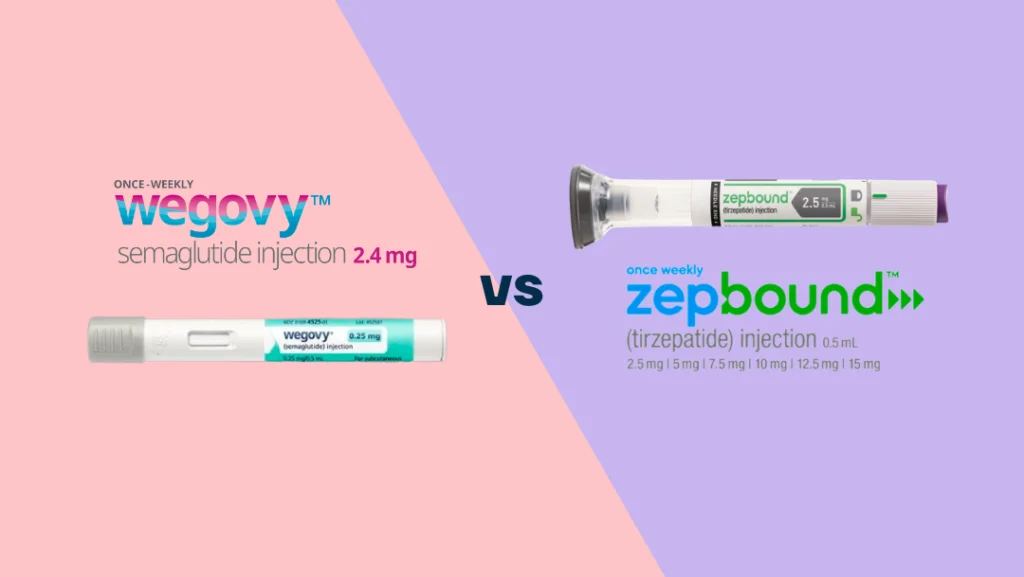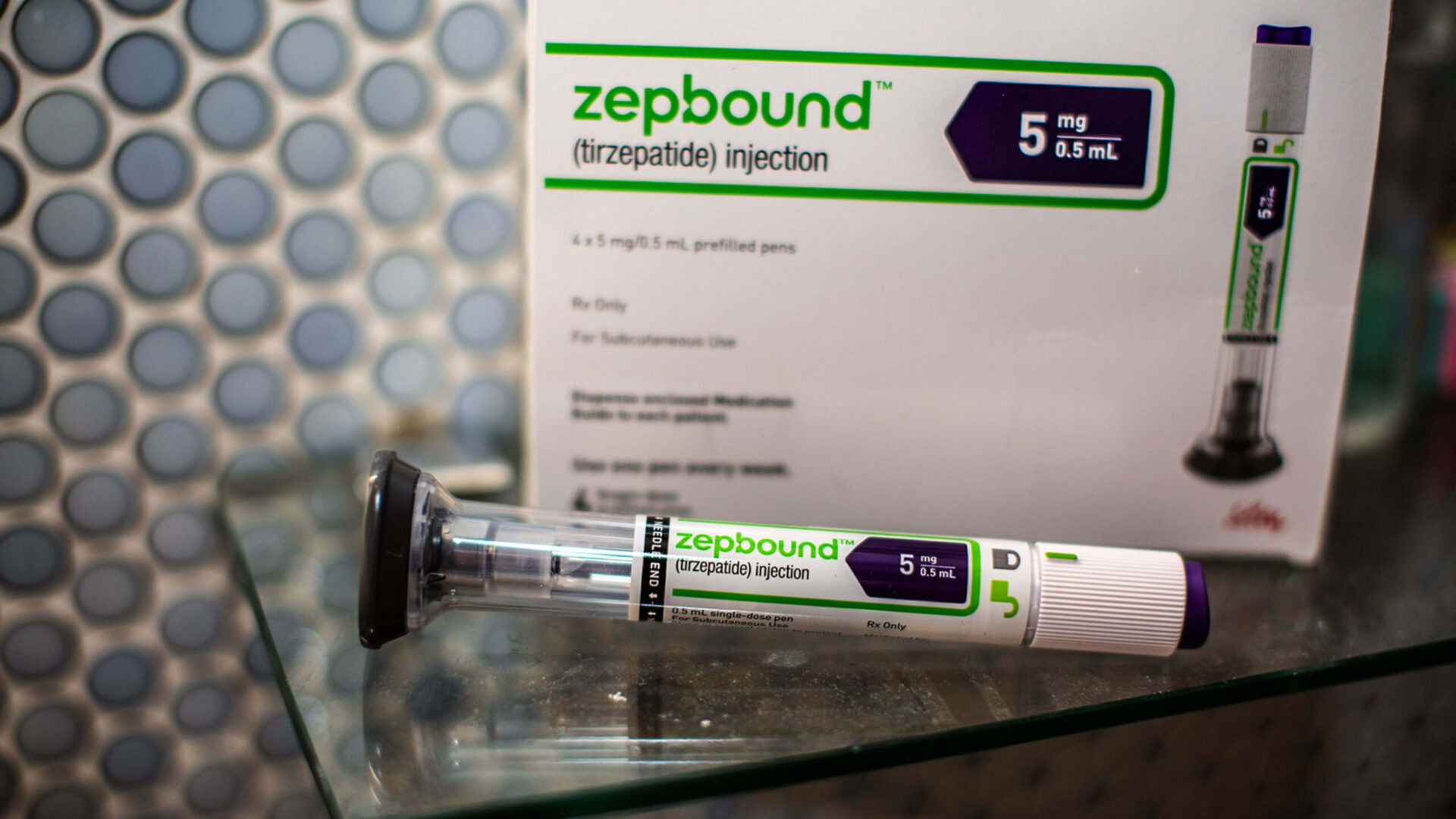Introduction
In recent years, weight loss drugs have garnered significant attention due to their potential to help people struggling with obesity. Among the drugs that have risen to popularity are Wegovy and Ozempic, both of which are GLP-1 receptor agonists that help with weight loss.
But now, a new drug named Zepbound is making waves in the weight loss industry. Many people are wondering, “What is Zepbound?” and more importantly, “Does Zepbound work better than Wegovy and Ozempic?”
In this article, we’ll dive into Zepbound, its potential benefits, and how it compares to other popular weight loss medications.
What is Zepbound?
Zepbound is a new weight loss drug that has recently been approved for use in the United States.
It belongs to the class of drugs known as GLP-1 receptor agonists, which have been shown to reduce appetite and promote weight loss. Similar to Wegovy and Ozempic, Zepbound works by mimicking the action of a hormone called GLP-1, which is naturally produced in the gut and plays a key role in regulating blood sugar and appetite.
The drug was developed to help those who are obese or overweight, especially individuals who struggle with other health conditions such as diabetes.
Like other GLP-1 receptor agonists, Zepbound works by enhancing insulin secretion, reducing appetite, and slowing down the emptying of the stomach.
This combination can help users eat less, feel fuller for longer, and ultimately lose weight. While Zepbound shares similarities with other GLP-1 drugs, it has been touted as a potentially stronger option in some cases.
How Does Zepbound Work?
Zepbound functions similarly to other weight loss drugs like Wegovy and Ozempic, but it has a unique formula designed to be more effective for certain individuals. It works by binding to the GLP-1 receptors in the brain, which helps regulate hunger and cravings. This leads to a decrease in appetite and an overall reduction in food intake.
As a result, those using Zepbound typically consume fewer calories throughout the day, leading to gradual weight loss.
In addition to reducing appetite, Zepbound also slows gastric emptying, meaning food stays in the stomach longer.
This results in prolonged feelings of fullness, helping users resist overeating. Furthermore, Zepbound can help improve insulin sensitivity, which is beneficial for people with type 2 diabetes or those at risk of developing it.
Zepbound vs. Wegovy and Ozempic

Wegovy and Ozempic are two of the most well-known weight loss drugs available today, both of which belong to the same class of GLP-1 receptor agonists as Zepbound.
While these drugs share many similarities in terms of their mechanisms of action, some key differences could make Zepbound a better option for certain individuals.
Effectiveness
When it comes to effectiveness, Zepbound has shown promising results in clinical trials. In some studies, it has outperformed both Wegovy and Ozempic in terms of weight loss.
People using Zepbound have reported more significant reductions in body weight compared to those using Wegovy or Ozempic.
This is mainly because Zepbound is formulated to deliver a stronger impact on appetite suppression, making it more potent in helping individuals reduce their food intake.
However, it’s important to note that individual results vary, and some people may still find success with Wegovy or Ozempic, depending on their response to the medication.
In general, Zepbound seems to be a more effective solution for those who have struggled with weight loss despite using other medications.
Side Effects
Like other GLP-1 drugs, Zepbound comes with potential side effects such as nausea, vomiting, diarrhea, and stomach discomfort. However, Zepbound is designed to reduce these side effects by offering a more gradual increase in dosage, which helps minimize gastrointestinal issues.
This makes Zepbound an appealing option for people who may have experienced discomfort with Wegovy or Ozempic.
On the other hand, Ozempic and Wegovy also come with side effects, but they may be less pronounced in some users. Since each person’s body reacts differently, finding the right drug with minimal side effects is often a trial-and-error process.
Dosing and Administration
Zepbound is administered as an injection, much like Ozempic and Wegovy. However, the dosing schedule may differ slightly.
Ozempic and Wegovy require weekly injections, while Zepbound may be administered with different frequency options based on a healthcare provider’s recommendation. This flexibility in dosing schedules can make Zepbound more convenient for some users.
Additionally, Zepbound has been designed to be easier for people to use at home without requiring a healthcare professional to administer the injection.
This is a significant advantage for those who prefer to manage their weight loss treatment on their own, reducing the need for frequent doctor visits.
Cost and Availability
Another factor to consider when comparing Zepbound to Wegovy and Ozempic is the cost. Wegovy and Ozempic are both expensive medications, with prices often exceeding several hundred dollars per month without insurance.
Zepbound, on the other hand, is still new to the market, and its pricing may be competitive with or even lower than Wegovy and Ozempic.
The availability of Zepbound may also vary depending on where you live, as the drug is still in the process of being rolled out in various regions.
Who is a Good Candidate for Zepbound?
Zepbound is designed for individuals who are obese or overweight, especially those who have struggled with traditional weight loss methods such as diet and exercise.
It is most commonly prescribed to individuals with a body mass index (BMI) of 30 or higher, or those with a BMI of 27 or higher if they have related health conditions such as type 2 diabetes or high blood pressure.
However, it’s important to consult with a healthcare provider before starting Zepbound. The drug may not be suitable for everyone, particularly for individuals who have a history of pancreatitis, certain types of thyroid cancer, or other medical conditions that could be exacerbated by GLP-1 receptor agonists.
The Pros and Cons of Zepbound
Pros:
- Effectiveness: Zepbound has shown strong results in clinical trials, with many users experiencing significant weight loss.
- Convenient Administration: Zepbound offers flexible dosing options and can be easily self-administered at home.
- Reduced Side Effects: The gradual increase in dosage helps minimize side effects compared to other GLP-1 medications.
Cons:
- Cost: While Zepbound may be priced competitively, it could still be expensive for some users without insurance.
- Side Effects: Like other weight loss drugs, Zepbound comes with potential side effects, such as nausea and gastrointestinal discomfort.
- Not for Everyone: Zepbound may not be suitable for individuals with certain medical conditions, so it’s important to consult a doctor.
Conclusion
So, does Zepbound work better than Wegovy and Ozempic? The answer depends on the individual. Zepbound is an effective weight loss solution, sometimes even outperforming Wegovy and Ozempic in terms of weight loss results.
However, the best weight loss drug for each person depends on their unique medical needs, preferences, and tolerance to side effects.
For those who have not found success with Wegovy or Ozempic, Zepbound may offer a new option to consider.
As with any medication, it’s important to consult with a healthcare provider to determine which drug is best suited to your needs. With its promising results, flexible dosing, and potential for fewer side effects, Zepbound is certainly a drug to watch in the weight loss space.
